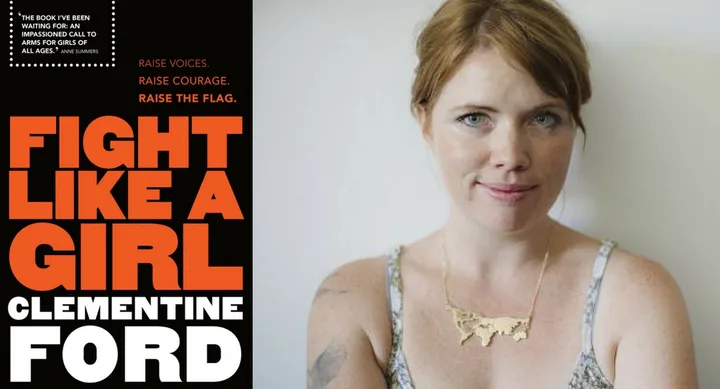I’m going to come right out and say it: Clementine Ford’s Fight Like A Girl should be required reading for all young women in Australia.
The outspoken writer, who has made her voice known through her often-provocative Fairfax column, and helped lead the way in discussions on domestic violence and ‘rape culture’ in Australia, released her first book last week.
Whether you agree or disagree with her philosophy, her book, which is part-memoir, part-manifesto, will challenge your thinking and open your mind to new perspectives on modern feminism.
Fight Like A Girl is confronting at times; Ford speaks candidly about her two abortions without shame or regret, opens up about her struggle with an eating disorder, and even discusses the importance of masturbation in graphic detail. She articulates her experiences with such startling relatability that it can be both comforting and terrifying to experience as a reader. For instance, many women will hear echoes of their own experience as she describes the power of the word ‘fat’ to silence young women, and her search for validation from others as a teenager, particularly men.
But while Ford addresses her discovery of feminism and the development of her philosophy through personal experiences, she also tackles broader issues in modern feminism, such as online abuse, domestic violence and sexual assault, deftly dealing with the cases of Stanford rapist Brock Turner and the rape and murder of Jill Meagher, for example.
Clementine Ford spoke in conversation with the editor of Good Weekend Amelia Lester at her Fight Like A Girl event at the Seymour Centre in Sydney last night.
Lester made an interesting distinction between Ford’s book and other modern feminist required reading, such as Lena Dunham’s Not That Kind Of Girl and Sheryl Sandberg’s Lean In. While Dunham and Sandberg made a point of saying that their books aren’t feminist manifestos, Ford’s intentionally aligns itself with the feminist movement, and owns it from the first chapter.
“Feminism helped me figure out a way of being a girl that doesn’t hurt,” she writes. “It is my constant companion, my life saver, my oxygen tank.
“I am a girl, and this is my manifesto. Welcome to the war room.”
Ford also argues in the book that feminism has given her two fundamentally important gifts: a sense of community among like-minded individuals, and through this, the gift of knowing that her thoughts and feelings are real. This in itself can be incredibly empowering for women.
In their discussion, Amelia Lester suggests that the chapter ‘Good Guys’ could be the most controversial of the lot. In it, Ford argues that men should not be congratulated for calling themselves feminist allies when they aren’t in fact actively doing anything to help the movement.
“As long as the system benefits you, it’s a system you have to engage with,” Ford told Lester, giving the example that being a white person against racism doesn’t mean you are incapable of being racist on any given day; whereas making yourself aware of how the system discriminates against others will allow you to better prevent this.
But Ford acknowledged that at the end of the day, she ‘writes for women’, and that her ideas will make some men uncomfortable. She argues that in order for change to happen, both women and men must push through this sense of discomfort.
Reading Fight Like A Girl reminded me of my first encounters with important feminist writers like Simone de Beauvoir and Germaine Greer – it reignited my feminist fire, my feelings of frustration, and before I could feel even a shadow of guilt about it, Ford finished the book with this perfectly timed gem:
“If you take just one message away from this book, then I hope it’s this one… It is okay for you to be angry.”
And she’s right. For women, anger is often associated with shame, and this has made many of us curl up in silence. It should be our right, not privilege, to make our voices heard.
However this particular reader still has some questions. After reading it cover to cover, the one thing I was left wanting was more solutions – yes, it’s okay to be angry, and yes the issues Ford addresses are real and worthy of our attention…but as an engaged feminist, now what?
How do we bring about change in our society and encourage others to do the same? This is a book written for women (that men should read too), but I worry that while it will confirm the views of some, it will alienate others – the very same people we need to engage with the movement.
Nevertheless, Clementine Ford’s debut book is powerful, and will create a conversation that we need to continue.
Because yes, Fight Like A Girl will make you angry. It will make you feel uncomfortable. But ultimately, it will inspire you to create change.
Fight Like a Girl by Clementine Ford is AUD $29.99 (Allen & Unwin).










